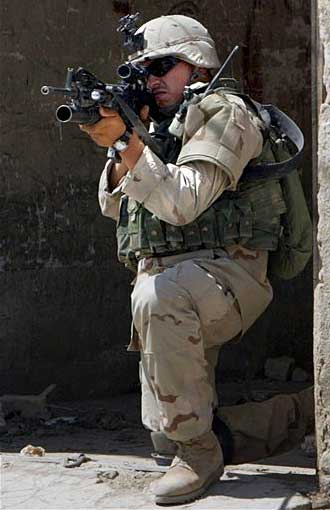|
 WASHINGTON
— Congress expects the White House to request as
much as $100 billion this year for war and related costs
in Iraq and Afghanistan, congressional officials say. WASHINGTON
— Congress expects the White House to request as
much as $100 billion this year for war and related costs
in Iraq and Afghanistan, congressional officials say.
It would be the third and largest Iraq-related
budget request from the White House yet, and it could
push the war's costs over $200 billion — far above
initial White House estimates of $50 billion-$60 billion.
So far, the Iraq war has cost about $130 billion, according
to the White House's Office of Management and Budget.
War costs complicate President Bush's
plans for initiatives such as overhauling Social Security.
They also threaten his pledge to halve the record $413
billion federal budget deficit.
Jim Dyer, chief of staff of the House
Appropriations Committee, traditionally the first stop
in Congress for any official request for money, said he
expects a funding proposal from the Bush administration
by Easter that "could be around $100 billion,"
the vast majority of it for Iraq.
In the Senate, Bill Hoagland, the top
budget aide to Majority Leader Bill Frist of Tennessee,
agreed: "Based on current spending profiles, it would
not surprise me if ... (a bill) approaching $100 billion
is requested early this year." That would be equal
to almost one-quarter of the Pentagon's $417.5 billion
2005 budget.
Both expect the proposal to come as a
"supplemental" spending request, a move that
would keep it out of the budget Bush will submit in February.
The White House budget office declined
to comment on the number. "It's too early to say
what our needs will be," spokesman Chad Kolton said.
He said the Iraq request is being kept out of the budget
to provide time to get a more accurate cost estimate and
to make it easier to reduce funding when U.S. troops are
eventually withdrawn.
Members of Congress expect a big price
tag for Iraq this year.
"I hope they ask for something big,"
said Sen. Lindsey Graham, R-S.C., a member of the Senate
Armed Services Committee. "Look, this is a test of
wills. We need to show our enemies that we are not going
to do this on the cheap. "
But there is growing annoyance with the
White House for refusing to treat the cost of the military
operations in Iraq — roughly $5 billion a month,
according to the House Appropriations Committee —
as part of the annual budget.
"There is a feeling among a lot of
members that ... this war has become enough of a routine
that they should be able to build it into their annual
budgeting and not have to come back to us for supplemental
funding of that size," said Rep. Jim Kolbe, R-Ariz.,
head of the House Appropriations panel that oversees spending
on foreign operations.
"The annual budget proposal we've
been given by the White House falsely portrays the bottom
line," said Rep. John Spratt, D-S.C., senior Democrat
on the House Budget Committee.
|